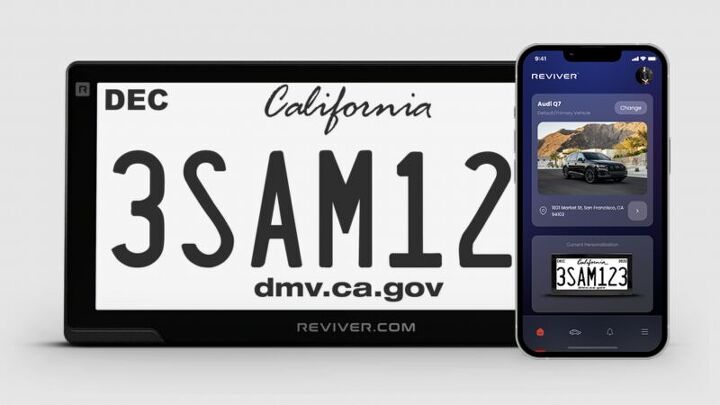Digital License Plates Gaining Traction in U.S.

Michigan has opted to allow digital license plates, making it the third state – after California and Arizona – to give them legal backing. The state’s legislature passed the necessary laws in 2019, making it legal for vehicles registered in Michigan to utilize digital vehicle identification while traveling throughout the rest of the nation. But the company that produces them, Reviver, has only just recently found itself in a position to furnish them.
“Drivers deserve a modern licensing solution that works for the way we live today. We are beyond excited to make digital license plates available to all drivers in Michigan,” stated Neville Boston, Reviver’s co-founder and Chief Strategy Officer. “I want to thank the state legislators and government representatives, as well as the many other transportation officials and partners throughout the state for working with us to help make this a reality – we are thrilled to reach this milestone.”
The devices themselves are monochromatic replacements for the stamped piece of metal that goes on the back of your vehicle. According to the manufacturer, they have the ability for some minor customization. For example, customers can pair the devices with their smartphones to swap between light and dark modes that reverse the background and text shades. But the real sales pitch revolves around what the “RPlate” can offer in terms of safety.
Reviver says having one equipped to your car allows for it to be tracked when it’s stolen (and presumably when it isn’t being stolen) while also allowing it to display relevant information in an emergency. The example given here was an amber alert, though the manufacturer said there was more to come as it developed relationships with law enforcement. Additional perks include not having to go anywhere for registration renewal. Customers can simply re-up via the internet without even having to bend down to swap stickers. However, those that forget will see their digitized plate swap to a giant display reading “INVALID” until they’ve shelled out the money.
But the alleged benefits come via a fairly steep subscription fee. Standard plate fees in Michigan cost roughly the same as a fast-food hamburger until you need a new one, whereas the RPlate will run you $19.95 a month for a battery-powered model that includes a replaceable battery. Versions that require a professional to actually hardwire the device into your car are $24.95 a month – plus the $150 installation fee.
It seems like a lot of money to spend on something that probably wouldn’t survive a fender bender and seems poised to further erode personal privacy.
Reviver says it’s presently in active discussions with 10 other states to get the hardware sold – something that doesn’t appear to require the company to give local government a share of its revenue. However, this is not the case for its “Auto Dealership Partner Program,” which now includes over 100 shops that will attempt to encourage shoppers to snag digital plates straight from the lot.
Future plans under consideration include working with manufacturers to integrate digital plates into the cars themselves and expanding the list of RPlate features. The business has also stated that it believes its hardware would be ideal for fleet management. But Reviver’s primary concern is getting all 50 states to offer them as an alternative to standard license plates that don’t require a monthly subscription and aren’t connected permanently to the internet.
[Images: Reviver]

A staunch consumer advocate tracking industry trends and regulation. Before joining TTAC, Matt spent a decade working for marketing and research firms based in NYC. Clients included several of the world’s largest automakers, global tire brands, and aftermarket part suppliers. Dissatisfied with the corporate world and resentful of having to wear suits everyday, he pivoted to writing about cars. Since then, that man has become an ardent supporter of the right-to-repair movement, been interviewed on the auto industry by national radio broadcasts, driven more rental cars than anyone ever should, participated in amateur rallying events, and received the requisite minimum training as sanctioned by the SCCA. Handy with a wrench, Matt grew up surrounded by Detroit auto workers and managed to get a pizza delivery job before he was legally eligible. He later found himself driving box trucks through Manhattan, guaranteeing future sympathy for actual truckers. He continues to conduct research pertaining to the automotive sector as an independent contractor and has since moved back to his native Michigan, closer to where the cars are born. A contrarian, Matt claims to prefer understeer — stating that front and all-wheel drive vehicles cater best to his driving style.
More by Matt Posky
Latest Car Reviews
Read moreLatest Product Reviews
Read moreRecent Comments
- Marcr My wife and I mostly work from home (or use public transit), the kid is grown, and we no longer do road trips of more than 150 miles or so. Our one car mostly gets used for local errands and the occasional airport pickup. The first non-Tesla, non-Mini, non-Fiat, non-Kia/Hyundai, non-GM (I do have my biases) small fun-to-drive hatchback EV with 200+ mile range, instrument display behind the wheel where it belongs and actual knobs for oft-used functions for under $35K will get our money. What we really want is a proper 21st century equivalent of the original Honda Civic. The Volvo EX30 is close and may end up being the compromise choice.
- Mebgardner I test drove a 2023 2.5 Rav4 last year. I passed on it because it was a very noisy interior, and handled poorly on uneven pavement (filled potholes), which Tucson has many. Very little acoustic padding mean you talk loudly above 55 mph. The forums were also talking about how the roof leaks from not properly sealed roof rack holes, and door windows leaking into the lower door interior. I did not stick around to find out if all that was true. No talk about engine troubles though, this is new info to me.
- Dave Holzman '08 Civic (stick) that I bought used 1/31/12 with 35k on the clock. Now at 159k.It runs as nicely as it did when I bought it. I love the feel of the car. The most expensive replacement was the AC compressor, I think, but something to do with the AC that went at 80k and cost $1300 to replace. It's had more stuff replaced than I expected, but not enough to make me want to ditch a car that I truly enjoy driving.
- ToolGuy Let's review: I am a poor unsuccessful loser. Any car company which introduced an EV which I could afford would earn my contempt. Of course I would buy it, but I wouldn't respect them. 😉
- ToolGuy Correct answer is the one that isn't a Honda.




































Comments
Join the conversation
WTF is the point of these?
Stop the madness! Track yourselves! No thanks